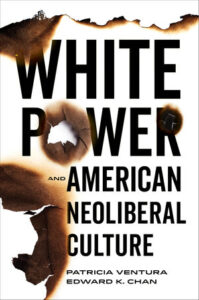by Patricia Ventura and Edward K. Chan, co-authors of White Power and American Neoliberal Culture
We didn’t set out to write a catalogue of horror—instead we stumbled upon these sadistic texts of white supremacy glorifying racist violence and terror while working on other projects about neoliberal culture, race, and utopia. Ed started down this trail in 2014 while working on The Racial Horizon of Utopia (published in 2016 by the Ralahine Centre for Utopian Studies based at the University of Limerick), stumbling upon an obscure, self-published novel that bemoaned the supposed hegemony of political correctness and social justice. It imagined a kind of multicultural “dystopia” essentially gesturing toward a white “utopia.” As part of a subgenre of utopian literature, the novel fits with a typical line of rightwing conservative thinking, especially that of demagogues, and continues the long history of racist utopian thought rooted in white supremacy and cognate forms like white (Christian) nationalism and white separatism, as well as the racist utopian writing from roughly the 1960s on, which feeds into what is now often referred to as “white power.”
These developments connected to Trish’s work on American neoliberal culture’s treatment of nonwhite and non-heteropatriarchal families in Neoliberal Culture: Living with American Neoliberalism (Routledge, 2012, 2017) and elsewhere. We realized we were witnessing the expressions of a larger and more fundamental insecurity about the status of white men in particular and the supposedly traditional family. Thus, we began to explore the intersections of our interests.
But as we began, we were forced to delve deeper into more extreme and hardcore white racist utopian writing—fiction, manifestos, philosophizing—that imagines how to eliminate nonwhite people, women who don’t follow the rules of white power ideology (especially intermarrying with nonwhites including Jewish people), LGBTQ+ folx who are not only not helping to propagate the white race but also engaging in supposedly repugnant practices, and basically anyone who doesn’t support the “cause.” Moreover, as we started to work on these sadistic texts, a series of horrendous events happened: repeated instances of racially motivated mass shooting spectacles; the 2016 US presidential election and its mainstreaming of previously marginal white extremist voices and beliefs; the 2017 Unite the Right rally in Charlottesville; and the January 6 Capitol Insurrection in 2021. Because of all these displays of a resurgent white identity politics, many are now paying attention, as we all should, to these contemporary versions of racism and fascism.
Our analyses of these forces resulted in White Power and Neoliberal American Culture. We use the white power utopian writing along with documents and statements of neoliberal ideology—speeches, thinktank reports, and the like—to think about the ways that neoliberalism and white supremacy intertwine and manifest as the current forms of racism, immiseration culture, and social alienation, prompting deep and powerful desires for collective identification with whiteness. The book examines the many white-identified extremist groups arising in recent years and continuing to gain notoriety, incorporating the concerns and the styles associated with an idealized “whiteness”—even as this term oscillates to include nonwhite sympaticos. Their perspective on American normality identifies explicitly with a reproductive masculinity whose ultimate motivation is embodied in the white power slogan, “We must secure the existence of our people and a future for white children.” Those who identify explicitly with white power are relatively small, but they have successfully normalized the call to political violence.
We also examine the large numbers of people who do not belong to any group of extremists but who are motivated by white replacement anxiety. We call this group the “far white,” and their fear is not fringe. Reportedly 70 percent of Republicans believe that nonwhite people are being brought into the US to replace them. In our book we argue that the forces of violent white extremism overlap with neoliberal culture through racial capitalism in the mutual idealization of the white heteropatriarchal family, and in this powerful combination, we see an acting out of the existential fear of that ideal’s demise. These people hold a Manichean world view in which brutality and violence is their ultimate option, and one group’s gain is another’s loss.
Although in many ways our book is a chronicle of hate and violence, we know that positive change requires understanding and identifying what is happening both within the US and around the world as authoritarian powers draw on ethnonationalism and neoliberal racial capitalism. We also know that these forces are rising up now because they are defensively and desperately reacting to progressive change. Thus, we also point to the spaces and forces of truly utopian desire that proponents of both white power and neoliberalism are desperate to fight—and in these we find hope.
